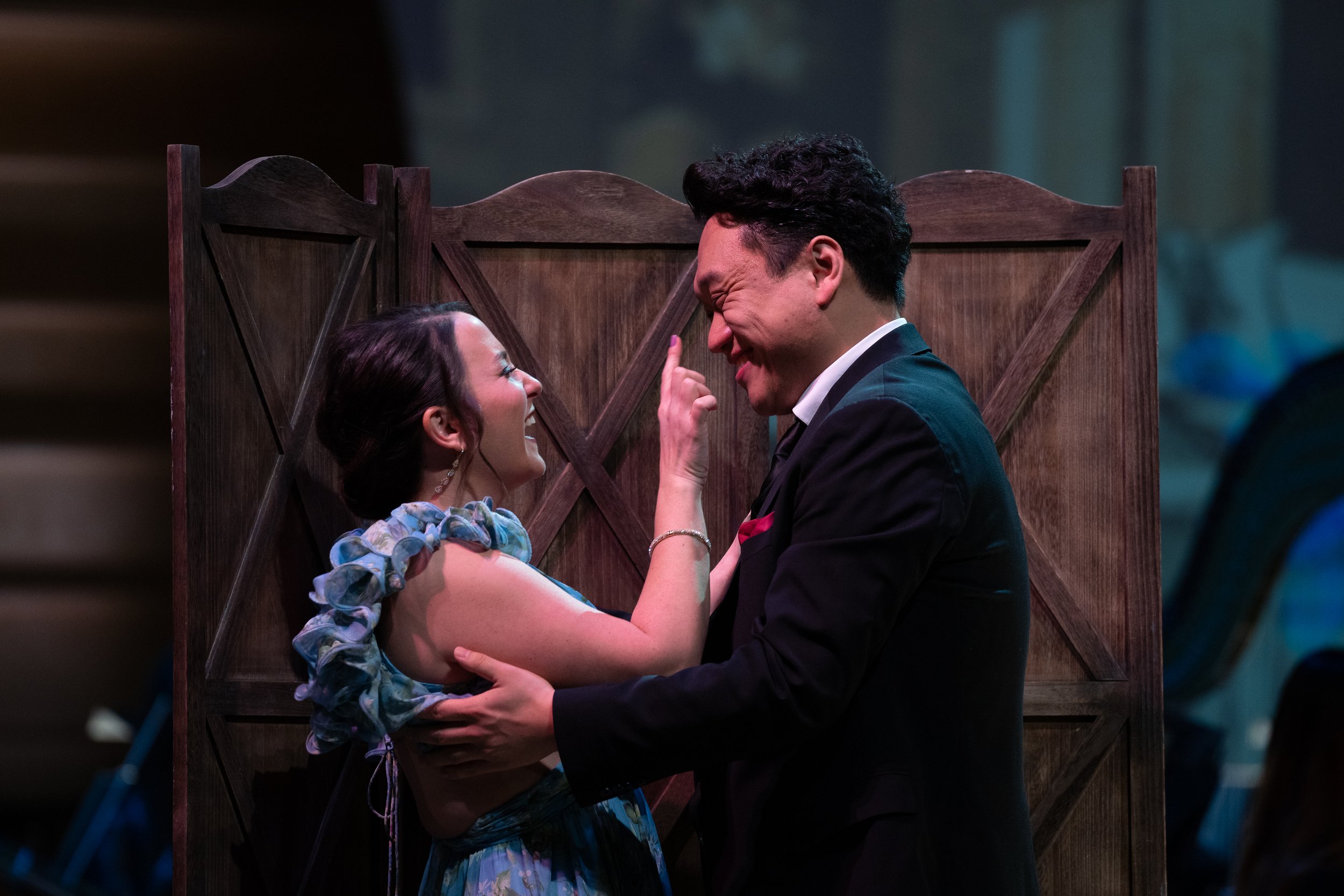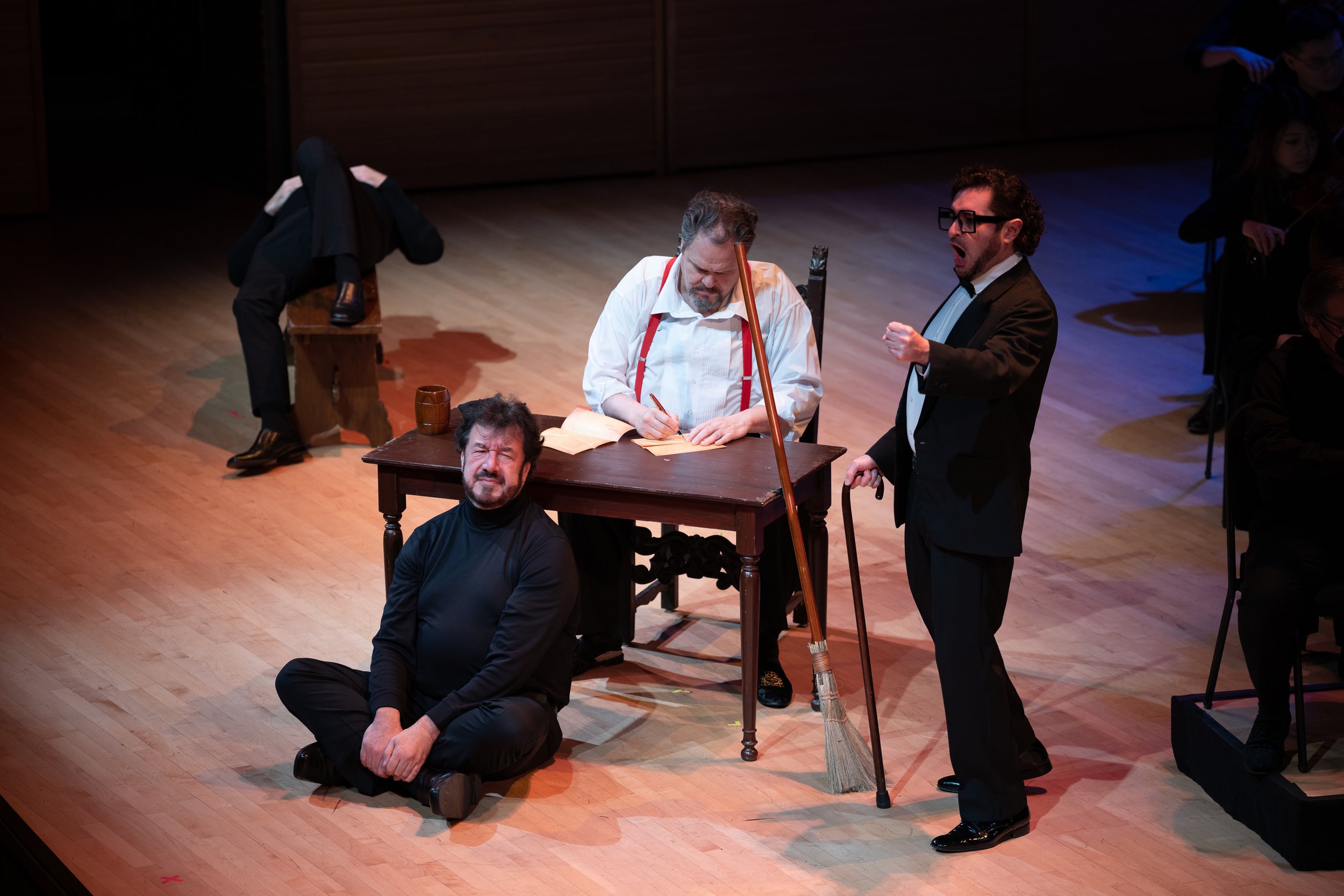Maryland Lyric Opera’s latest edition of its world class, community-based opera program took another step forward with Friday night’s performance of Falstaff by composer Giuseppe Verdi and librettist Arrigo Boito. One of the best crowds of the season turned out, filled out in part by students from local schools; MDLO’s policy of any seat in the house for $10 for any student with a student ID is paying dividends for the company, and I believe, for opera itself. A highly entertaining pre-performance talk included Conductor Joseph Colaneri and an appearance by one of the all-time great baritones, Sherrill Milnes, who took questions and entertained the attendees with anecdotes from his storied career. A stellar cast of mainly MDLO veterans delivered another highly entertaining episode in MDLO’s a Season of Verdi.
Brian Major as Ford (l) and Mark Delavan as Falstaff (r). Photo by Julian Thomas Photography and courtesy of Maryland Lyric Opera.
In the opera, Sir John Falstaff, struggling with his impecunious situation, attempts the seduction of Mrs. Alice Ford and Mrs. Meg Page. His motivations are as much to prop up his ego and replenish his purse as to satisfy his sexual urges. He sends the same letter of interest to both Alice and Meg, who are friends and compare notes. With the help of their friend Mistress Quickly and Alice’s daughter Nanetta, they plan to have some fun humiliating the fat, old knight and teaching him a lesson. Separately, Alice’s wealthy husband Ford learns from Falstaff’s associates, Bardolfo and Pistola, of Falstaff’s plot, and he sets a plan for revenge in motion. The ladies are better connivers, and it is they who teach Falstaff a lesson; they also successfully plot to get Nanetta married to her chosen, Fenton, instead of the wealthy Dr. Caius, her father’s choice.
(l to r standing): Mary Feminear as Alice Ford, Catherine Martin as Mistress Quickly, and Allegra de Vita as Meg Page as a hiding Falstaff (Mark Delavan) peeks out of the basket. Photo by Julian Thomas Photography and courtesy of Maryland Lyric Opera.
Falstaff (1893, three acts) was Verdi’s final opera, completed when he was approaching 80, and his second full collaboration with Arrigo Boito, the first being Otello (1887). It was Verdi’s second comedy; his first, Un giorno di regno, written early in his fifty-year career, was unsuccessful. While Falstaff is a comedy based on Shakespeare’s The Merry Wives of Windsor and parts of Henry IV, the great Maestro considered Falstaff to be a depiction of character, not an opera buffa. Musicologists and opera critics consider Falstaff to be an uproarious comedy; but though amusing, there was only mild laughter in the audience Friday night. Musicologists report that Boito used humorous language from 17th century Italy (in the manner of Boccaccio’s The Decameron) to create inside jokes. Soprano Rosa Feola has said, “The story is taken from Shakespeare, but it has an Italian soul.” That said, I personally find its comedy to be stale at best, though I find it appealing as a humorously played character study, with Falstaff forced to see himself as he really is when his ego is demolished. The MDLO production was a concert version that was semi-staged. Director David Gately arranged for the comedic elements as well as could be done in this setting. The stellar group of ten named singer/actors were well cast and made for an entertaining, enjoyable performance, impossible not to like, especially in the second half with the MDLO Chorus completing the ensemble under the direction of Chorus Master Husan Park.
left photo: Rachel Blaustein as Nannetta and Yi Li as Fenton. right photo: Mark Delavan as Falstaff seated at desk, Andrea Silvestrelli as Pistola seated on floor, and Mauricio Miranda as Dr. Caius standing. Photos by Julian Thomas Photography and courtesy of Maryland Lyric Opera.
The overall excellent cast was headed by bass-baritone Mark Delevan, who was outstanding as Falstaff. Mr. Delavan commanded the stage, singing with authority and convincingly conveying the different facets of Falstaff’s personality, most dramatically in portraying his final disillusionment and, at least partial, redemption. He was ably assisted, then duped by his colleagues, Bardolfo sung by tenor Joseph Michael Brent and Pistola sung by bass Andrea Silvestrelli; each singer added to the fun. These three performers had appeared with MDLO previously as had tenor Mauricio Miranda who ably played the role of Dr. Caius and tenor Yi Li who engagingly portrayed Fenton, Nannetta’s love interest. The lone newcomer to be added to the MDLO fold was a prized one, baritone Brian Major who sang the role of Ford with superb voice control and acting; he proved to be an excellent choice for this character.
(l to r): Yi Li as Fenton, Rachel Blaustein as Nannetta, Joseph Michael Brent as Bardolfo, Andrea Silvestrelli as Pistola, Brian Major as Ford, and Mauricio Miranda as Dr. Caius. Photo by Julian Thomas Photography and courtesy of Maryland Lyric Opera.
The interactions and ensemble singing of the four female singers was a highlight of the performance. Soprano Mary Feminear sang the role of Alice Ford while soprano Rachel Blaustein played her daughter Nanneta; mezzo-soprano Allegra de Vita sang the role of Meg Page, and mezzo-soprano Catherine Martin played Mistress Quickly. All were delights. Perhaps most impressive for her acting as a messenger/instigator of plots was Ms. Martin, while perhaps the most impressive singing was by Ms. Blaustein, new to the MDLO stage, who floated frequently and beautifully in her high range.
Full stage view of the MDLO Orchestra on stage and the MDLO Chorus in the balcony behind the stage with singers Rachel Blaustein as Nannetta, Allegra de Vita as Meg and Mary Feminear as Alice standing. Photo by Julian Thomas Photography and courtesy of Maryland Lyric Opera.
Conductor Joseph Colaneri, who also conducted Maryland Lyric Opera’s Macbeth, led another good performance by the MDLO Orchestra. Unusual for Verdi, his last opera has no overture and is through composed without the usual arias; thus, the music moves fast, constantly changing to reflect the dialog. Couple that with ten singers moving on and off the stage, many ensemble numbers, lighting changes (Lighting Designer Stuart Duke), subtitles on one of two screens that are changing with interesting mood-reflecting images (Projection Designer Sarah Tunderman)…it was a lot to take in, making it difficult to focus on any one element and sometimes difficult to keep up. Great entertainment but difficult to follow sometimes, and I found it difficult to receive the full measure of Verdi’s music for this opera in the half before intermission. However, in the second half I thought the orchestra became more of a focus involving the chorus, and it included a few beautiful almost-arias, one by Falstaff, one by Fenton, and one by Nanetta; the ending fugue involving all ten singers was also a treat. The second half made me more of a Falstaff fan than I had been. In retrospect, while an overload of entertainment is probably audience preferred, I might have liked a more traditional format of just singing and music, allowing for greater appreciation of Verdi’s magnificent music.
Maryland Lyric Opera’s Season of Verdi will continue in March with a production of Otello. As I am fond of saying - MDLO opera on the weekend; it’s what you do.
The Fan Experience: There were two performances of Falstaff, January 20 and 22, at the Strathmore Music Center in Bethesda (Note: on January 22, the role of Mary Ford was sung by soprano Teresa Perrotta). The opera was sung in Italian with projected subtitles in English. MDLO’s Season of Verdi will continue March 3 and 5 in the same venue with performances of Otello. There were hints that baritone Sherrill Milnes might again be part of the pre-opera discussion again for that one.
The Strathmore concert hall is a beautiful structure that has outstanding acoustics for concert performances. Strathmore is conveniently located close to the Grosvenor Metro Stop on the Rockville Pike. Use of the parking deck is free on evenings and weekends. I have found parking there to be easy in and easy out. Cafeteria style food is offered again as pandemic restrictions have been limited, and there is a cash bar on lower level.
Thanks to Maryland Lyric Opera patrons and contributors, tickets for any seat in the house will remain $10 for students with a student ID.






